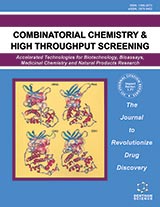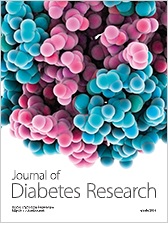Zuo Gui Wan
How to submit an article:
- Registered users can submit any published journal article that has a unique DOI (Digital Object Identifier) name or link to Research Hub.
- For example, you can paste the full DOI link:
https://doi.org/10.1109/5.771073or just the DOI name:10.1109/5.771073into the field above and click submit. - The person who is first to submit a valid article to Research Hub will forever be credited for it, and every article submission earns you +6 Research Points.
Published research studies are articles that present the findings of original research that has undergone a peer-review process and has been made publicly available in scholarly journals, books or other media.

A Network Pharmacology Study on the Similarities and Differences in the Mechanisms of Zuo Gui Wan/You Gui Wan for the Treatment of Premature Ovarian Failure
2022 Oct 18 Combinatorial Chemistry & High Throughput Screening Shanshan Mei, Chaoqin Yu, Jie Ding, Wen Cheng
Network Pharmacology Zuo Gui Wan You Gui Wan Premature ovarian failure (POF) Ovarian InsufficiencyThe Chinese medicine formulas Zuo Gui Wan and You Gui Wan have the potential to treat premature ovarian failure through different pharmacological pathways.

An evaluation of the effects and safety of Zuogui pill for treating osteoporosis: Current evidence for an ancient Chinese herbal formula
2020 Oct 21 Phytotherapy Research Li J, Sun K, Qi B, Feng G, Wang W, Sun Q, et al.
Systematic Review Meta-Analysis Zuo Gui WanZuo Gui Wan combined with anti-osteoporosis drugs may have beneficial effects on osteoporosis with respect to bone mineral density and bone metabolism markers.

Evaluating Traditional Chinese Medicine and Herbal Products for the Treatment of Gestational Diabetes Mellitus
2019 Dec 03 Journal of Diabetes Research Xu YXZ, Xi S, Qian X
Review Article Raspberry Leaf Gestational Diabetes Zuo Gui WanTraditional Chinese medicine, especially Zuo Gui Wan, red raspberry leaves, and Orthosiphon stamineus, seems to control gestational diabetes effectively without reported toxicity.

Mechanisms of Zuogui Pill in Treating Osteoporosis: Perspective from Bone Marrow Mesenchymal Stem Cells
2018 Sep 19 Evidence-Based Complementary and Alternative Medicine Yang A, Yu C, You F, He C, Li Z
Review Article Osteoporosis Zuo Gui Wan
Zuo Gui Wan Alters Expression of Energy Metabolism Genes and Prevents Cell Death in High-Glucose Loaded Mouse Embryos
2018 Jun 25 Evidence-Based Complementary and Alternative Medicine Liang Q, Qu Z, Liang Y, Feng QJ, Niu X, Bai T, et al.
Zuo Gui Wan (ZGW) had a protective effect on embryonic cell death caused by glucose loading. The reversion of inhibition of ribosome pathway and regulation of mitochondrial energy metabolism are main effects of ZGW on high-glucose loaded embryos.
Animal Study Zuo Gui WanResearch insights are moderated by the Research Hub team and offer an at-a-glance overview of interesting research findings.

2022 Combinatorial Chemistry & High Throughput Screening
The Chinese medicine formulas Zuo Gui Wan and You Gui Wan have the potential to treat premature ovarian failure through different pharmacological pathways.
Network Pharmacology Ovarian Insufficiency Premature ovarian failure (POF) You Gui Wan
A Network Pharmacology Study on the Similarities and Differences in the Mechanisms of Zuo Gui Wan/You Gui Wan for the Treatment of Premature Ovarian Failure
Shanshan Mei, Chaoqin Yu, Jie Ding, Wen Cheng

2020 Phytotherapy Research
Zuo Gui Wan combined with anti-osteoporosis drugs may have beneficial effects on osteoporosis with respect to bone mineral density and bone metabolism markers.
Systematic Review
An evaluation of the effects and safety of Zuogui pill for treating osteoporosis: Current evidence for an ancient Chinese herbal formula
Li J, Sun K, Qi B, Feng G, Wang W, Sun Q, et al.

2019 Journal of Diabetes Research
Traditional Chinese medicine, especially Zuo Gui Wan, red raspberry leaves, and Orthosiphon stamineus, seems to control gestational diabetes effectively without reported toxicity.
Review Article Gestational Diabetes Raspberry Leaf
Evaluating Traditional Chinese Medicine and Herbal Products for the Treatment of Gestational Diabetes Mellitus
Xu YXZ, Xi S, Qian X
Review Articles
Review articles summarise and critically evaluate the current state of research on a specific topic or field by synthesising multiple primary research studies.

An evaluation of the effects and safety of Zuogui pill for treating osteoporosis: Current evidence for an ancient Chinese herbal formula
2020 Oct 21 Phytotherapy Research Li J, Sun K, Qi B, Feng G, Wang W, Sun Q, et al.
Systematic Review Meta-Analysis Zuo Gui WanZuo Gui Wan combined with anti-osteoporosis drugs may have beneficial effects on osteoporosis with respect to bone mineral density and bone metabolism markers.

Evaluating Traditional Chinese Medicine and Herbal Products for the Treatment of Gestational Diabetes Mellitus
2019 Dec 03 Journal of Diabetes Research Xu YXZ, Xi S, Qian X
Review Article Raspberry Leaf Gestational Diabetes Zuo Gui WanTraditional Chinese medicine, especially Zuo Gui Wan, red raspberry leaves, and Orthosiphon stamineus, seems to control gestational diabetes effectively without reported toxicity.

Mechanisms of Zuogui Pill in Treating Osteoporosis: Perspective from Bone Marrow Mesenchymal Stem Cells
2018 Sep 19 Evidence-Based Complementary and Alternative Medicine Yang A, Yu C, You F, He C, Li Z
Review Article Osteoporosis Zuo Gui WanClinical Trials
Clinical trials are research studies that involve people and are conducted to evaluate the safety and efficacy of new treatments or interventions, such as drugs, medical devices, or behavioural therapies.
Study Protocols
Published study protocols are detailed plans that outline the objectives, methodology, statistical analyses, and organisation of a research study that have been made publicly available for others to review and use as a reference.
Presentation Slides

Network Pharmacology
The Chinese medicine formulas Zuo Gui Wan and You Gui Wan have the potential to treat premature ovarian failure through different pharmacological pathways.
Shanshan Mei, Chaoqin Yu, Jie Ding, Wen Cheng

Systematic Review
Zuo Gui Wan combined with anti-osteoporosis drugs may have beneficial effects on osteoporosis with respect to bone mineral density and bone metabolism markers.
Li J, Sun K, Qi B, Feng G, Wang W, Sun Q, Zheng C, Wei X, Jia Y

Review Article
Traditional Chinese medicine, especially Zuo Gui Wan, red raspberry leaves, and Orthosiphon stamineus, seems to control gestational diabetes effectively without reported toxicity.
Xu YXZ, Xi S, Qian X
Executive Summary
Write an executive summary in the form of a blog article on the topic of "Research into Chinese medicine treatment for Zuo Gui Wan" summarising the research below and using language that can be easily understood by patients and avoiding medical jargon using a professional and caring tone of voice.
Write an executive summary in the form of a blog article on the topic of "Researched Chinese medicine treatments for Zuo Gui Wan" summarising the research below in an objective and easy to understand way, and using language that can be easily understood by patients. Group the article into Chinese medicine treatments first, followed by nutrition and other treatments. Avoid using medical jargon and use a professional and caring tone of voice.
Write me a concise but easy to understand executive summary on the topic of "Chinese medicine treatments for Zuo Gui Wan" based on the following research that I will give you. Your summary should be 2 paragraphs long in Australian English spelling and include references to the studies.
A Network Pharmacology published in 2022 in the journal Combinatorial Chemistry & High Throughput Screening found that The Chinese medicine formulas Zuo Gui Wan and You Gui Wan have the potential to treat premature ovarian failure through different pharmacological pathways. This study used a public database to identify the active ingredients and potential targets of the Zuo Gui Wan and You Gui Wan compounds. These were analyzed in relation to premature ovarian failure (POF) related genes obtained from OMIM and GeneCards. A protein-protein interaction network was established using STRING, and a drug-active ingredient-target gene network was constructed. The study thus identified similarities and differences in potential targets, active ingredients, and enriched pathways between the two compounds. Analyzing the drug-target-pathway network revealed that both compounds contain multiple common active ingredients, as well as unique components, and share several targets in the treatment of POF, showing similar core mechanisms of action. However, each compound also targets some unique pathways, which indicates their differential approaches to POF treatment.
A Systematic Review published in 2020 in the journal Phytotherapy Research found that Zuo Gui Wan combined with anti-osteoporosis drugs may have beneficial effects on osteoporosis with respect to bone mineral density and bone metabolism markers. Our pooled results show that ZGP combined with anti-osteoporosis drugs may have beneficial effects on osteoporosis with respect to BMD and bone metabolism markers. There were no ADRs when using ZGP alone, but ADRs of ZGP combined with anti-osteoporosis drugs included gastrointestinal discomfort (nausea, diarrhoea), dizziness, and fatigue. However, a definite conclusion regarding other indicators cannot be drawn from the existing information. The results of this review demonstrate that ZGP is a potential candidate for osteoporosis treatment, although the quality of evidence remains weak.
A Review Article published in 2019 in the journal Journal of Diabetes Research found that Traditional Chinese medicine, especially Zuo Gui Wan, red raspberry leaves, and Orthosiphon stamineus, seems to control gestational diabetes effectively without reported toxicity. The study initiated a systematic search across PubMed, Web of Science, and Embase databases to pinpoint research discussing the impact of traditional Chinese medicine on pregnancy. The results were then further narrowed down to focus on any correlation with all forms of diabetes mellitus. The primary thread that emerged was the beneficial effect of three main herbal remedies: Zuo Gui Wan, red raspberry leaves, and Orthosiphon stamineus. Based off of the results from this search, a focal review of these herbal elements and their associations with type 2 diabetes mellitus was undertaken. Across the board, these remedies demonstrated positive effects on metabolic health, especially among women dealing with gestational diabetes. No experimental models reported any toxicity or harmful side effects associated with these herbal treatments. The report calls out that current studies on both conventional and alternative interventions for gestational diabetes are immensely lacking, emphasizing the need for a standardized protocol to evaluate the efficacy of these herbal medicines.
Moderation Tools
Topic
Sign In
Users not signed in are limited to viewing the 5 most recent items of content.